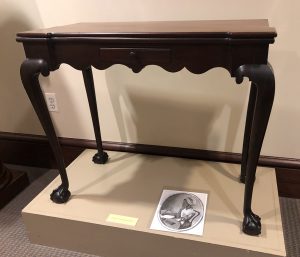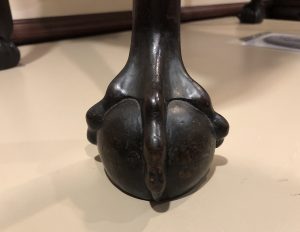By LJ Woolcock, Library Assistant
It’s National Novel Writing Month, and particularly in this year of plague, thousands of writers across the country (myself included) are spending their free minutes at their computer or holding a pen, scribbling to reach a goal of 50,000 new words of a creative work. It’s a daunting task. Especially with our souls being bombarded on all sides by what’s going on in the rest of the world, it’s doubly hard to quiet the anxiety and assert your creative voice. To inspire us all, here’s an extraordinary object from the MHS collections.
One of the most precious objects in our collections is Phillis Wheatley’s desk. Wheatley was the first African woman to publish a book in North America: Poems on Various Subjects, Religious and Moral, in 1773.

After being stolen from her home in West Africa and enduring the months-long, deadly journey of the Middle Passage, Wheatley was brought to Boston, where she was sold to John Wheatley, a Boston merchant and tailor. She learned to read and write English, and to read Greek and Latin. She began writing poetry, translating her complex struggles into verse.
It’s essential to remember that although Wheatley was an extraordinary woman, she wasn’t “fortunate.” Even though her enslavers supported her education and literary efforts, she was still enslaved. The Wheatleys exploited her labor and her literary talents: they showed her off to friends, and didn’t free her until after she published her book in 1773. She was constantly questioned, actually having to defend that she wrote her poems in court in 1772 to a panel of Massachusetts’ most prominent politicians and slaveholders, who couldn’t conceive that an African woman could write so beautifully.
One of the things that I love most about objects is how they give us the chance to physically connect with history. When I stand in front of Wheatley’s desk, I am in awe that I stand so close to the place where her work took flight. I am able to connect with the history of Black struggle and oppression in the Americas in a different way than reading about the history of slavery. In a time when Africans and African Americans were sold and treated as property, it must have been so powerful for Wheatley to have this piece of furniture—a physical manifestation of the freedom she had eked out for herself, and a place where her mind could roam free. The desk itself is simple, yet so beautiful. I love its distinctive clawed feet, balancing gracefully on wooden balls.

Being in the presence of a historical object encourages us to walk with a person from another time. Approaching a desk is a familiar experience for all writers. When I go to sit at my own desk to work, I feel a complex mix of emotions: fear, that my writing won’t be good; excitement, to discover what happens next in my story; joy, that I get to play with words and create something out of nothing.
Approaching Wheatley’s desk in the MHS, I wonder how she felt when she went to write each day. Relief, that she was walking towards one of the few places she could be entirely herself? Was her mind already so wrapped up in words that she rushed to it, eager to write something down? How did she cope with her fears, her doubts?
Yet Wheatley and I stand in entirely different positions: as a white queer person, I did not have to face the horrors of the Middle Passage or enslavement. The privilege afforded to me by my skin means I live in comfort, without fearing for my life or facing the economic and social inequalities that African Americans do. My world was built on Wheatley’s back, and on the backs of so many others who didn’t get a chance to write their books, because they were robbed of their lives, their chance at an education, their freedom. I have to grapple with that, too.
It reminds me of the words of the lesbian poet Audre Lorde, who said, “Our white fathers told us: I think, therefore I am. The Black mother within each of us—the poet—whispers in our dreams: I feel, therefore I can be free (“Poetry is not a luxury,” 38).” When I read this quote, I always think of Wheatley: a woman who wrote herself free; a mother who died trying to stave off the poverty she endured in the later part of her life, because the white supremacy of the new United States continued to press her. Still, she wrote. She felt, and wrote, and made beauty out of suffering.
After Wheatley’s sudden death in 1784, from an illness she contracted while out working trying to support herself and her infant child while her husband was imprisoned, the desk was sold at auction. It is a chilling full circle. Her child died soon after her own death, also from illness.
The power of Wheatley’s life and perseverance have long outlived the systems of oppression that shaped her world, and they continue to be a guiding light. I hope Wheatley’s desk gives us all strength as we try to get words on the page, and makes us brave enough to tell more honest and diverse stories.
Whether you’re writing a novel, short story, poetry, screenplay, video game, fan fiction, or non-fiction (perhaps even a history?) I wish you the best of luck. Keep heading to your desk (or wherever you write) each day. Get words on the page. Try not to turn down the voices in your head telling you to stop. Because as Audre Lorde said: “…there are no new ideas. There are only new ways of making them felt—of examining what those ideas feel like being lived on Sunday morning at 7 a.m., after brunch, during wild love, making war, giving birth, mourning our dead—while we suffer the old longings, battle the old warnings and fears of being silent and impotent and alone, while we taste new possibilities and strengths.” (“Poetry is Not a Luxury,” 39)
Works Cited
Lorde, Audre. “Poetry is Not a Luxury,” Sister Outsider: Essays and Speeches (Berkeley: Crossing Press, 1984), 36-40.
If you’re interested in reading more on Phillis Wheatley, check out the following books:
Vincent Carretta, Phillis Wheatley: Biography of a Genius in Bondage (Athens: University of Georgia Press, 2011).
Richard Kigel, Heav’nly Tidings from the Afric Muse: The Grace and Genius of Phillis Wheatley, (St. Paul, MN: Paragon House, 2017).
Henry Louis Gates, Jr., The Trials of Phillis Wheatley: America’s First Black Poet and Her Encounters with the Founding Fathers (New York: Basic Civitas Books, 2003).
Darlene Clark Hine and Kathleen Thompson, A Shining Thread of Hope: The History of Black Women in America (New York: Penguin Books, 1998).

